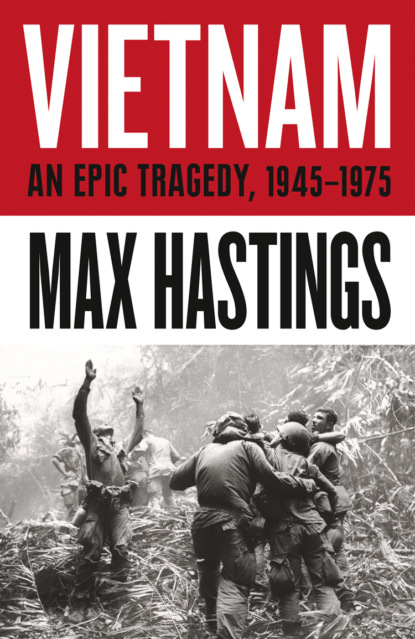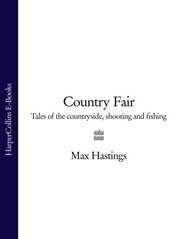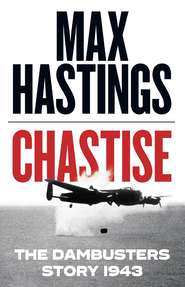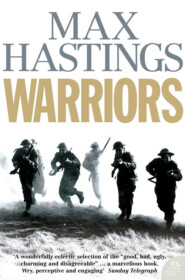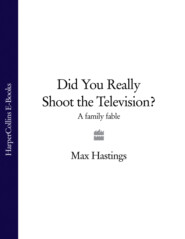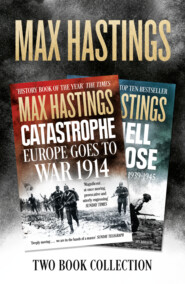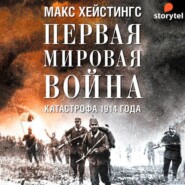По всем вопросам обращайтесь на: info@litportal.ru
(©) 2003-2024.
✖
Vietnam: An Epic History of a Divisive War 1945-1975
Настройки чтения
Размер шрифта
Высота строк
Поля
In 1924 he travelled to Moscow, meeting Russia’s new leaders and spending some months at the so-called University of Oriental Workers before moving on to Canton, where he became an interpreter for the Soviet adviser to Chiang Kai-shek. Three years later, after Chiang turned on the communists, Ho fled back to Europe. A French acquaintance described a conversation on a bridge over the Seine, during which the Vietnamese said reflectively, ‘I always thought I would become a scholar or writer, but I’ve become a professional revolutionary. I travel through many countries, but I see nothing. I’m on strict orders, and my itinerary is carefully prescribed, and you cannot deviate from the route, can you?’
‘Orders’ from whom? There are many mysteries concerning Ho’s life. He never married, and his emotional needs appear to have been fulfilled by commitment to political struggle. Who funded his global travels? Was he a paid servant of Moscow, or did he merely receive ad-hoc financial assistance from political fellow-travellers? It is unsurprising that he became a communist, because the world’s capitalists were implacably hostile to his purposes. He was less remarkable for his own writing and thinking, which were unoriginal, than for an extraordinary ability to inspire in others faith, loyalty and indeed love. A Vietnamese student wrote of a first meeting with Ho some years later in Paris: ‘He exuded an air of frailty, a sickly pallor. But this only emphasized the imperturbable dignity that enveloped him as though it was a garment. He conveyed a sense of inner strength and generosity of spirit that impacted upon me with the force of a blow.’
In 1928, Ho appeared in Bangkok, a rendezvous for exiled Indochinese nationalists. The following year he moved to Hong Kong, where he presided over a meeting of leaders of rival Vietnamese factions, held in a football stadium during a match to evade police attention. He persuaded his compatriots to unite under the banner of the Indochinese Communist Party, which in 1931 was formally recognised by the Moscow Comintern. During the years that followed, a series of revolts took place in Vietnam. The French responded with bombings of suspected insurgent villages, and guillotinings of identified leaders. Though Ho was not directly linked to the risings, he was now a wanted man, pursued through the European powers’ colonies. After a series of adventures, he escaped into China by persuading a Hong Kong hospital employee to have him declared dead. Thereafter he commuted between China and Russia, suffering chronic privations and recurrent sicknesses. A French communist agent who met him during his odyssey described Ho as ‘taut and quivering, with only one thought in his head: his country’.
Early in 1941, after an absence of three decades, he secretly returned to Vietnam, travelling on foot and by sampan, and assuming the pseudonym by which he would become known to history – Ho Chi Minh, or ‘Bringer of Light’. He took up quarters in a cave in the hills of the north, where he met young men who embraced this fifty-year-old as ‘Uncle Ho’, among them such later heroes of the revolution as Pham Van Dong and Vo Nguyen Giap. Giap at first introduced Ho to the little guerrilla group by saying, ‘Comrades, this is an old man, a native of this area, a farmer who loves the revolution.’ But they quickly realised that this was no local, and certainly no farmer. Ho drew maps of Hanoi for those who had never seen it, and advised them to dig latrines. A veteran recalled: ‘We thought to ourselves, “Who is this old man? Of all the things he could tell us, he gives advice about how to take a shit!”’ Nonetheless Ho was readily accepted as leader of the group, and indeed of the new movement, which they called the Vietnam Independence League, shortened to Vietminh. Its leaders did not disguise their own ideological commitment, but only much later did they explicitly avow communism as their only permitted creed.
Nazi mastery of western Europe drastically eroded France’s authority in its colonies, and intensified peasant suffering. In Indochina the French requisitioned to meet their own needs such basic commodities as matches, cloth, lamp oil. In the Mekong delta there was a brief 1940 communist-led rising in which several French officials were killed, army posts seized. Rice granaries were occupied and their contents distributed, bridges broken down by insurgents waving hammer-and-sickle flags. The so-called Nam Ky insurrection lasted just ten days, and only a small minority of local people participated, yet it emphasised the rage latent in the countryside.
From the summer of 1940 onwards, Tokyo exploited its regional dominance to deploy troops in Indochina, first to sever the Western supply route to China, later progressively to establish an occupation, which provoked President Franklin Roosevelt to impose his momentous July 1941 oil embargo. Although the French retained nominal authority, the Japanese thereafter exercised real power. They craved commodities to supply their domestic industries, and insisted that the Vietnamese should curtail rice-growing in favour of cotton and jute. This, together with enforced export of foodstuffs, created increasing hunger among the inhabitants of the richest rice-producing area in South-East Asia.
In 1944, a drought followed by floods unleashed a vast human tragedy. At least a million Vietnamese, one in ten of Tonkin’s population, perished in a famine as disastrous as the contemporaneous East Bengal disaster in British India. There were credible reports of cannibalism, yet no Frenchman is known to have starved. The famine remained in the memory of many northern Vietnamese as the most dreadful experience of their lives, not excluding subsequent wars. One peasant’s earliest memories of life in a village near Hanoi were of his mother scolding the children if they wasted food: ‘You wouldn’t do that if you remembered 1945.’
Another peasant described deserted hamlets and desperate people: ‘Skinny bodies in rags roamed every country road and city street. Then corpses began to appear along roadsides and in pagoda yards, church grounds, marketplaces, city parks, bus and railway stations. Groups of hungry men and women with babies in their arms and other children at their sides invaded every accessible field and garden to search for anything they thought edible: green bananas, cores and bulbs of banana trees, bamboo shoots. The people of my own village had to defend their land by force.’ Oxcarts carried away corpses, to be interred in mass graves. One day his three-year-old sister was eating a rice cake outside their house when an emaciated young man ‘who looked like a ghost in ragged clothes’ sprang forward, snatched the morsel from her hand and darted away.
In some areas charity food kitchens were established to provide gruel for the starving, and long queues gathered before them. Van Ky, a Tonkin teenager who became a famous Vietminh balladeer, said later: ‘When you opened the front door in the morning, you might see a corpse lying there. If you saw a big flock of crows, that meant a body underneath.’ It is unsurprising that such experience bred revolutionaries, including Ky himself. He was born in 1928 into a peasant family, but grew up in the unusually literate household of an uncle, from whom he learned La Fontaine’s fables and performed little plays based on them. He read such books as Victor Hugo’s Les Misérables. By the age of fifteen, Ky was distributing leaflets for the communists. He became chief of his local secret militia, serving until it was decided that he had artistic talents more useful to the Revolution than his military ones. Communist propagandists exploited music to great effect, resetting traditional folk songs to fit their own message, delivered by travelling troupes. Ky later wrote a ballad entitled ‘Hy Vong’ – ‘Hope’ – which became one of the favourite tunes of the Resistance. His experience demonstrated a notable aspect of the independence struggle: that a respect for French culture was no barrier to a determination to see France quit Vietnam.
2 THE VIETMINH MARCH
The last phase of the world war had momentous regional consequences. In March 1945 the Japanese staged a coup, deposing the French puppet regime and assuming full mastery over Vietnam. Colonialism was sustainable only as long as it appeared to subject peoples as the inevitable order, a perception changed forever in South-East Asia. Vietnamese recoiled from the new rulers’ brutalities, but were impressed by the spectacle of fellow-Asians wielding authority: some called the Japanese ‘oai’ – ‘awe-inspiring’. In July the Office of Strategic Services – US sponsor of guerrilla war – dispatched to Indochina a team of paramilitary agents led by Major Archimedes Patti, who pitched camp with Ho Chi Minh. Those callow young men, like so many of their kind both American and British in occupied countries around the world, were grateful to find friends in a hostile environment: they fell in love with the romance of their circumstances, and with their hosts. A twenty-two-year-old guerrilla told one of the OSS men with jocular humour that he should not show himself outside their camp at Tan Trao, ‘because if the Japanese catch you, they will eat you like a pig!’ When he chortled to Giap about this sally, however, he was reprimanded: ‘We are revolutionaries, and the members of this team are our allies, so we must talk to them in a cultured and civilised way.’
Washington’s Indochina policy-making was fumbling and erratic. The allied warlords were preoccupied with completing the defeat of Germany and Japan. From Yugoslavia to Burma, however, and from Greece to Vietnam, local nationalists focused their ambitions almost exclusively upon securing political control, once Axis forces were gone. Colonial subjects saw no merit in securing liberation from fascist suzerainty, only to bend once more beneath the yoke of their former masters, whether French, British or Dutch. The OSS team with Ho became fascinated by his personality, and allowed themselves to suppose that the arms with which they supplied him were being used to harry the Japanese. In truth, the Vietminh staged a few small showpiece actions against the occupiers, but focused upon building their organisation and husbanding weapons to fight the French. Ho’s appointed military chief was Giap. This former teacher and avid student of history had no military training whatsoever when, on 22 December 1944, he formed the so-called Vietnamese Liberation Army Propaganda Unit, just thirty-four strong, three of them women. On 15 May 1945 this body was absorbed into an embryo ‘Liberation Army’.
Modern Hanoi histories record with glee the manner in which communist cadres exploited Western arms and training to pursue their own purposes. In 1943, following the Allied occupation of French Madagascar, the British secret warfare organisation Special Operations Executive recruited seven Vietnamese prisoners whom its officers found languishing in a Vichy prison. These men assured the liberators of their eagerness to return home to fight, without mentioning that they numbered the French among the fascist foes. A later Vietminh account asserted: ‘The seven intelligence men appeared to be Allied agents, but their hearts and minds belonged to communism.’ After the usual training in the black arts they were parachuted back into Vietnam, fearing rejection by the Party for having accepted service with SOE. Instead they received a warm welcome, and were promptly ordered to signal Calcutta for more arms, wirelesses and medical supplies.
The suddenness with which the war ended in August 1945 enabled Ho to seize the initiative, to fill a power vacuum that yawned widest in the north. His emissaries persuaded Bao Dai, Vietnam’s whimsical and indolent young puppet emperor, to write to the Paris government asserting that the only way to safeguard France’s position was ‘by frank and open recognition of the independence of Vietnam’. Gen. Charles de Gaulle, interim master in Paris, declined to respond to this missive, but was obliged grudgingly to notice that before abdicating on 25 August Bao Dai had invited Ho to form a government. The Vietminh leader marched his followers into Hanoi, Tonkin’s capital, and on 2 September 1945 proclaimed before a vast and ecstatic crowd in the city’s Ba Dinh square the establishment of a Vietnamese state. He declared: ‘The French have fled, the Japanese have capitulated, Emperor Bao Dai has abdicated, our people have broken the fetters which for over a century have tied us down.’
The news was broadcast throughout the country, and a schoolboy who lived south of Hue later recalled: ‘Our teachers were so happy. They told us we must go out and celebrate independence. They said that when we are old men … we must remember this as a day of celebration.’ Ho in his speech quoted from the US Declaration of Independence, and secured a propaganda coup when the OSS group allowed itself to be photographed saluting the Vietminh flag-raising ceremony. By chance, at that moment a flight of USAAF P-38 fighters roared overhead: in the eyes of thousands of beholders, the US thus laid its blessing upon the new government.
In truth, of course, a cluster of idealistic young State Department and OSS men merely exploited Washington’s lack of a policy to make their own weather. Patti, upon whose considerable vanity Ho played like a lute, described the Vietminh leader as ‘a gentle soul’, and another American said, ‘We felt that he was first a nationalist, second a communist.’ The major admitted long afterwards, ‘I perhaps was somewhat naïve with respect to the intent and purpose in using the words [of the 1776 Declaration] … But I felt very strongly that the Vietnamese had a legitimate gripe or claim, to really govern themselves. After all what was [the Second World War] all about?’
Charismatic leadership is a determinant in most revolutionary struggles – consider India’s Gandhi and Nehru, Kenya’s Kenyatta, Cuba’s Castro. Ho Chi Minh established a legitimacy that proved impregnable even when the shortcomings and indeed barbarities of his regime became apparent, because in 1945 he seized sole ownership of Vietnam’s independence movement. Sixteen-year-old Nguyen Cao Ky wrote later that in those days in Hanoi ‘the one name on my lips, as well as those of nearly everyone of my generation, was Ho Chi Minh’. Many households began to display his portrait: in the words of another young Vietnamese, ‘We were hungry for a hero to worship.’ The French had made no attempt to foster an indigenous political class with any sympathy for the aspirations of its own people: rich and educated Vietnamese existed in a world entirely alien from that of the peasantry. While Ho and his intimates knew that few would endorse an avowed communist prospectus, he was able to unite a great swathe of his people behind expulsion of the French. In the years that followed, he achieved a mystic stature unrivalled by any fellow-countryman.
During the early years of the independence struggle, in ‘liberated zones’ land was compulsorily transferred from landlord to peasant ownership. Ho and his associates did not reveal that they viewed redistribution as a mere transit stop, pending collectivisation. Political cadres painted a glowing picture of Russia as an earthly paradise, which Vietnam should aspire to emulate. Ho himself exuded an aura of dignity and wisdom that impressed all those who met him, and proved a brilliant political manipulator. Beneath a veneer of benignity, he possessed the quality indispensable to all revolutionaries: absolute ruthlessness about the human cost of the courses he deemed appropriate for his people. It seems a fair test of any political movement to enquire not whether it is capitalist, communist or fascist, but whether it is fundamentally humane. A remark attributed to Giap answered this question for the Vietminh: ‘Every minute, hundreds of thousands of people die upon this earth. The life or death of a hundred, a thousand, tens of thousands of human beings, even our compatriots, means little.’
Ho Chi Minh’s conduct reflected the same conviction, though he was too astute a politician ever to be recorded by Westerners as expressing it. There has been much debate about whether he was a ‘real’ communist, or instead merely a nationalist driven by political necessity to embrace Lenin’s creed. Evidence seems overwhelming in favour of the former view. He was never the Titoist some of his Western apologists suggested: he repeatedly condemned Yugoslavia’s 1948 severance from the Soviet bloc. He avowed an unflagging admiration for Stalin, though the Russian leader never reciprocated either by trusting the Vietminh leader or by providing substantial aid to him.
It seems narrowly possible that Vietnam’s subjection to communism could have been averted if France in 1945 had announced its intention to quit the country, and embarked upon a crash transition process to identify credible indigenous leaders and prepare them to govern, as did the British before quitting Malaya. Instead, however, the French chose to draft a long suicide note, declaring their ironclad opposition to independence. The colonialists’ intransigence conceded to Ho Chi Minh the moral high ground in the struggle that now began to unfold.
De Gaulle bore chief responsibility for this blunder. In March 1945 he overrode the views of Pierre Messmer, his liaison officer in the Far East, who argued the necessity of parleying with the Vietminh. Instead, the haughty general committed the restoration of French authority to the intractable colonialist Admiral Thierry d’Argenlieu, who became high commissioner in Saigon. In some parts of the world, Africa notable among them, a dearth of credible nationalist movements enabled European empires to cling to their power and privileges for a further generation. In Vietnam, however, as elsewhere in Asia, foreign hegemony became unsustainable once local leaders found voices that could not be silenced, together with audiences to heed them. This was the reality that France spent the ensuing decade attempting to deny.
On 12 September 1945, less than a month after the Vietminh appropriated authority in Hanoi, British and Indian troops landed in Saigon. They freed the embittered French colonialists from their prisons, and dismissed the Vietminh aspirants to power amid messy and bloody skirmishing, in which some Japanese were deployed alongside the allies. The British commander, Maj. Gen. Douglas Gracey, asserted: ‘The question of the government of Indochina is exclusively French.’ One of his officers described a first encounter with the Vietminh: ‘They came to see me and said “welcome” and that sort of thing. It was an unpleasant situation and I promptly kicked them out. They were obviously communists.’ Gracey is sometimes criticised for using his troops to suppress Ho’s people. Yet he was merely a relatively junior soldier, no Caesar nor even Mountbatten, mandated to emulate many of his peers around the world in those days: use bayonets to restore the pre-war order.
At Washington’s behest 150,000 Chinese troops, Chiang Kai-shek’s men, descended upon northern Vietnam to assume a share of the allied occupation role. The Vietnamese dubbed them tau phu – the ‘swollen Chinese’ – because they all seemed to have bulging feet, perhaps from beriberi. The newcomers behaved more like locusts than warriors, stripping the countryside of everything edible or portable. They interfered little with Ho’s energetic extension of his political authority, and obligingly sold weapons to the Vietminh. Early in October 1945 the first French troops appeared in Saigon, but more than a year elapsed thereafter – a delay priceless for the communists and fatal to the imperialists – before they reasserted control in the north.
At the age of sixteen, student Pham Phu Bang was an enthusiastic revolutionary who saw the Vietminh exclusively as an independence movement: ‘I knew nothing about communism.’ When the Japanese swept over the country, at first he found it thrilling to see fellow-Asians humiliate the French colonial power – ‘like two great water buffaloes locking horns’. After Japan’s collapse Bang started his own revolutionary career, stealing weapons from careless Chinese soldiers, writing posters and banners proclaiming ‘Up with Ho Chi Minh’, ‘Long Live Free Vietnam’. One day he joined a train taking rice north to famine-stricken areas, which became trapped at a bridge wrecked by allied bombing. Its Vietminh escort enlisted local villagers to hump sacks across the river, but soon found the train besieged by a throng of starving people. Young Bang was accosted by a skeletal figure who had been given a can of rice for himself, but pleaded desperately for one more for his child. ‘We argued a lot among ourselves about who was to blame for these terrible things – the Japanese who ruled; the French who took as much food as they wanted to feed themselves; or the Americans who had bombed the railways. We decided it was all three. We asked each other: why did our small, fragile country have so many enemies?’
In the course of 1945–46 the Vietminh took over the non-communist Vanguard Youth movement and suppressed other opposition groups in the north. Many of the rival leaders were jailed, and in the countryside some thousands of alleged ‘enemies of the people’ were liquidated. The Vietminh hustled to announce its own triumph in a 4 January 1946 national election, as assuredly rigged as was every other ballot in Indochina through the decades that followed. For a brief season while the Chinese army and allied representatives were conspicuous in the north, a semblance of free speech was tolerated. By mid-June, however, most of Chiang’s men were gone, and purges resumed.
Ho’s people moved swiftly and effectively to secure control of rural areas, especially in the remotenesses towards the Chinese border. In the Mekong delta, by contrast, early in 1946 the French reasserted themselves, so that insurgent structures had to evolve secretly, alongside the colonial administration. Among Vietminh returnees from imprisonment was Le Duan, who two decades later would become ruler of his country. As the French expelled the Vietminh from urban areas, he was among those who established himself in the delta countryside, where guerrillas began to fight. And the colonial power fought back.
France’s adoption of this doomed course derived in significant measure from its humiliation in the Second World War. A similar disaster was averted in India, probably only because British voters at their 1945 election displayed the wisdom to endorse a socialist government, which made the historic decision to quit the subcontinent and Burma. By contrast, in Paris in the summer of 1945 a black delegate from Guyana, Gaston Monnerville, asserted: ‘without the Empire, France today would be no more than a liberated country … Thanks to her Empire, France is a victorious country.’ Successive revolving-door governments of the Fourth Republic proved feeble in everything save a willingness to deploy force in France’s overseas possessions, with a ruthlessness seldom matched by the Soviets. Following a 1945 Muslim revolt in Algeria in which a hundred Europeans were killed, an estimated twenty-five thousand people were slaughtered by French troops. After a March 1947 rebellion in Madagascar, where thirty-seven thousand colons lorded it over 4.2 million black subjects, the army killed ninety thousand people. Only in the enervating climate of a world that had exhausted its stock of moral outrage could the creation of such mountains of corpses by a European power have passed with so little remark. Algeria and Madagascar provide important context for the matching bloodshed that descended upon Indochina.
More puzzling than France’s rashness and inhumanity was US willingness to support them. Without military aid, Paris’s colonial policy would have collapsed overnight. Fredrik Logevall observes that there would have been no contradiction about an American decision to assist France’s domestic revival, while withholding backing for its imperial follies. Washington’s contrary call was made partly because, even before the Cold War became icy, policy-makers recoiled from acquiescence in communist acquisition of new territorial booty. While American liberal intellectuals detested colonialism, in an era when much of their own country was still racially segregated, the spectacle of white men lording it over ‘lesser races’ did not seem as odious as it would soon become. In the late 1940s, French policy was less closely linked to US anti-communism than it later became, but the interests of the Vietnamese people – or for that matter of their Malagasy, Algerian and suchlike brethren – ranked low in the priorities of President Harry Truman.
Some Vietnamese at first regarded the return of the French as an acceptable temporary expedient, to rid themselves of the Chinese plundering the north. Ho Chi Minh received token recognition as master of Tonkin, while Bao Dai’s nominal rule over the country was acknowledged. In July 1946, when Ho visited Paris for talks about the constitutional future, he was greeted with the honours of a head of state. This, however, was mere window-dressing. In the talks at Fontainebleau that followed, the Paris government made it plain that he had been summoned only to receive the instructions of his masters, not to negotiate a reassignment of power. De Gaulle said: ‘United with the overseas territories which France opened to civilisation, she is a great nation. Without these territories she would be in danger of no longer being one.’
The head of the French delegation told a Vietminh representative contemptuously: ‘We only need an ordinary police operation for eight days to get all of you out.’ For some weeks, Ho lingered in frustration. Truong Nhu Tang, almost three decades later a Southern revolutionary minister, was among a group of Vietnamese students who met their hero in Paris. They were entranced when the aspiring national leader instructed them to call him ‘Uncle Ho’ rather than ‘Mr President’. He asked their opinions about Vietnam’s future, devoted an afternoon to conversation with them: ‘It is hard to think of another world leader who under similar circumstances might have done the same.’ When Ho found that the north, centre and south of the country were all represented in the student group, he said, ‘Voilà! The youth of our great family … You must remember, though the rivers run dry and the mountains crumble, the nation will always be one.’ His remarks profoundly impressed his young compatriots, because they evoked ‘the language of slogan and poetry that Vietnamese leaders had always used to rally the people … From that afternoon I was Ho Chi Minh’s fervent partisan. I had been won by his simplicity, charm, familiarity. His … burning patriotism offered me a role-model for my own life.’
Ho returned to Tonkin knowing that no peaceful settlement was attainable. The French behaved with unswerving duplicity: as fast as more troops, planes and warships became available, they tightened their grip in the south, then reached out for the north. That summer of 1946 their foremost soldier, Philippe Leclerc, directed military operations: he branded Ho an enemy of France, and unwisely declared the conflict as good as won. The general treated with contempt Giap, Ho’s former intelligence chief who was then presumptive Vietminh ‘minister of defence’. Giap’s broad, infectious grin deluded some Westerners into believing that he was a more genial and pliable figure than his leader. In truth, Giap’s vanity matched his ruthlessness: the Frenchman’s casual insults fuelled his loathing for the colonialists.
Leclerc belatedly changed his mind about Indochina, becoming convinced that it could not be held in the face of a nationalist hostility shared by communists and non-communists alike. Yet shortly afterwards he was killed in an air crash in Africa, and Thierry d’Argenlieu thereafter dominated his country’s policy-making. The high commissioner was a figure of Jesuitical inflexibility, who persuaded the Paris government that the Vietminh could be crushed: ‘It is from now on impossible for us to deal with Ho Chi Minh … We shall find other people with whom we can negotiate.’ The French dallied with promoting the young ex-emperor Bao Dai. Yet in Vietnam, as in many oppressed nations around the world, a tide was running strongly for the Left. No other Vietnamese remotely matched the grip upon popular imagination secured by Ho.
In November 1946, following the breakdown of negotiations, the French launched a brutal naval and air bombardment of the Vietminh’s alleged strongholds in and around the port of Haiphong. Several thousand people perished, and only the city’s European quarter escaped devastation. On 19 December d’Argenlieu issued an ultimatum calling on the Vietminh to quit, to which they responded by staging an armed insurrection in Hanoi, sustained for sixty days. When at last they were expelled amid widespread destruction, the French deluded themselves that they had regained control of Tonkin.
Foreign observers were sceptical, however. A correspondent of The Times of London wrote in December: ‘Any colonial power which puts itself in the position of meeting terrorism with terrorism might as well wash its hands of the whole business. We are about to see the French army reconquer the greater part of Indochina only to make it impossible for any French merchant or planter to live there outside a barbed-wire perimeter.’ Ho and Giap, preparing for a long campaign, needed bases beyond range of France’s airfields and heavy guns. Thus, their main army, some thirty thousand strong, abandoned towns and cities and marched away to Viet Bac, the remote north-western region.
The Vietminh leaders, who became cave- or hut-dwellers, never deluded themselves that they could achieve absolute military victory. Instead, they sought merely to make French rule prohibitively costly. To this end, covert local groups waged guerrilla war, while regular forces launched setpiece operations where conditions appeared favourable. They relied chiefly on captured weapons, but also began to manufacture their own, assisted by some three thousand Japanese deserters. With boundless ingenuity, they scavenged French cartridge cases for reloading, made mines from captured shells and mortar bombs. At the outset, they exercised overt or secret control of around ten million people, most of whom paid taxes to them, and performed labour or military service. Though the Vietminh denounced opium trafficking as a manifestation of colonial exploitation, Ho boosted the movement’s revenues by the same means.
Families are almost sacred hubs of Vietnamese society, yet in those days many became riven. Ten-year-old Tran Hoi’s father was a Hanoi small businessman who continued to acquiesce in French rule. He said: ‘If we have to choose between colonial domination and communism, I will take colonialism, because it means access to Western civilisation.’ There was a bitter row when Hoi’s uncle, a doctor, announced his own determination to join Ho Chi Minh. The clan’s divisions, like those of many others, remained unhealed through decades of strife that now began to unfold.
2
The ‘Dirty War’ (#ulink_01ed182d-006c-5f78-b53b-32ddd4ad401d)
1 STEAMROLLER TYPES
In the early months of 1947 Charles Trenet crooned irresistibly, reminding the world of the glory of the French language: ‘La mer, qu’on voit danser la long des golfes claires’, words rendered banal in English: ‘The sea, that we see dancing the length of the bright bays’. Christian Dior seized the imagination of fashionable womankind with his New Look, unfolding swathes of fabric beneath a tight waist and bodice, putting to flight years of austerity. French culture, style, beauty both natural and man-made, were once more ascendant. From Paris the writer Nancy Mitford tirelessly mocked her English compatriots for their inability to match her hosts’ cuisine, wit, sophistication.
And yet these same clever, conceited, morbidly insecure people chose to immerse themselves in a brutal colonial war eight thousand miles from home, which eventually cost their own side more than ninety thousand dead, and the Vietnamese people far more. Most of the inhabitants of metropolitan France regarded the struggle to preserve their overseas empire – la sale guerre, ‘the dirty war’ – with indifference, if not outright cynicism. De Gaulle, now in political exile, displayed belated doubts, which soon became certainty, that France had no vital interest in Indochina, and could not prevail there. Yet a vocal minority cared passionately, and promoted a fabulously expensive military commitment.
George Orwell observed that the quickest way to end a war is to lose it, whereas it was France’s misfortune to take almost a decade to achieve this. The struggle for Indochina took different forms, according to the regions of the country. In the north, large forces manoeuvred and fought against communist formations that eventually mustered sixty thousand men, supported by a revolving cast of peasant porters. A Vietminh document declared the dry season between October and April ‘most propitious for fighting’, while the rainiest months from May to October, when movement became difficult, were for rest, training, redeployment, planning. Meanwhile in towns and cities, the French strove to combat terror attacks – bombs thrown into crowded cafés, shootings of officials. Such incidents became part of a new normality: at a mayoral reception in Haiphong, guests were momentarily alarmed by a nearby explosion and gunshots, but cocktails and conversation resumed when it was learned that a Vietminh had merely been shot dead after tossing a grenade at a police station. In one unusually successful and cruel attack, guerrillas burst in upon a dinner party held at a French home at Cap St Jacques, near the mouth of the Saigon River. They killed with grenades and old British sten guns eight officers, two women, six children and four Vietnamese servants.
Across the countryside, a network of almost a thousand forts and miradors – watchtowers skirted with mines, concertina wire, logs, sandbags, corrugated iron and trenches prickling with sharpened bamboo stakes – was created to protect villages and roads. These had indifferent success in containing the Vietminh, who lifted the mines for their own use, and could usually overrun a local post if they set their minds to it. French small craft fought fierce battles on the Black River against guerrillas firing from the shore.
Meanwhile, high in the mountains and deep in the jungle, French special forces of the GCMA – Groupement de Commandos Mixtes Aéroportés – led tribesmen who hated the communists for their own reasons. Since insertion and extraction were dependent upon airstrips, some GCMA men went native because they had no choice; more than a few never returned to civilisation. This became the last conflict in which paratroops made repeated operational jumps, some as often as once a week. For most French units, however, this was a road-dominated war, in which helicopters played only a marginal role: even in the struggle’s last days, the colonial power owned just twenty-three. Infantry conducted an interminable succession of sweeps across the countryside, with such lyrical code names as Citron, Mandarine, Mercure, Artois, Mouette and Nice I & II. These killed some Vietminh, but only in return for a terrific expenditure of effort and intensification of peasant grievances.
Giap had attended no war college, yet read voraciously: he became obsessed with Napoleon, Clausewitz and the guerrilla tactics of Mao. His forces achieved one of their first high-profile successes on 27 January 1947, ambushing a convoy carrying Vietnamese politicians in French service on an inspection tour of the north. Fourteen vehicles were destroyed, the education minister and a French engineer killed. The attack impressed the authorities by its boldness and efficiency, and more of the same followed. Route 5 from Hanoi to Haiphong became known as ‘the road of blood’. A village on the north–south Route 1 was so notorious an ambush site that the French bulldozed it.
The two sides competed in ruthlessness. The Vietminh executed village chiefs who declined to bow to their will, often by live burial before peasant audiences, after subjecting them to tortures of medieval ingenuity. When the Vietminh killed one Vietnamese soldier captured in French service, a guerrilla borrowed a pair of pliers from a nearby house, with which he removed the man’s gold fillings. A child witness wrote: ‘I had seen many corpses beheaded, dismembered, eviscerated, even scalped, yet nothing more disgusting than the sight of that guerrilla holding the two gold teeth, his face beaming.’ Vietnamese adapted readily to conducting covert lives in parallel with their overt ones, because their society had a long tradition of secret associations.
The French employed every extravagance of firepower on the battlefield, and allowed their troops almost absolute licence behind it. The writer Norman Lewis described his first flight to Saigon. His neighbour in the Air France plane was a Foreign Legion colonel, who peered at the Mekong delta below with the jaundiced eye of familiarity. As they passed a cluster of huts at two thousand feet, Lewis’s innocent gaze fixed upon what might have been a wisp of incense curling upwards. Then he grasped that it was, instead, a billowing pall of smoke. When moving specks also became visible, his neighbour the Legionnaire observed sagely, ‘Une opération.’ Lewis wrote: ‘Somehow, as he spoke, he seemed linked psychically to what was going on below. Authority flowed back into the travel-weary figure. With the accession of this priestly essence he dominated the rest of the passengers. Beneath our eyes violence was being done, but we were as detached from it almost as from history … One could understand what an aid to untroubled killing the bombing plane must be.’
French brutality was driven partly by the habit of racial domination, partly by consciousness that even if many peasants were not active foes, they knew where the enemy was, in which culvert or on what path his snares awaited the unwary. The colonialists and their allies of the Cao Dai and Hoa Hao – southern religious sects with formidable private armies – are reckoned to have killed five civilians for every one of their own people who perished. The November 1948 massacre of over two hundred Vietnamese women and children at My Trach, in the southernmost province of what would become North Vietnam, is scarcely acknowledged in modern France, yet seems evidentially beyond doubt. Meanwhile, following incidents such as an ambush in which the founders of the Hoa Hao were killed, ‘The Hoa-Hao liked to tie Viet-Minh sympathisers together with rope and throw them into the rivers to drown in bundles,’ in the words of Bernard Fall, ‘floating down the river like so many trains of junks, at the mercy of the currents and tides.’
An American, Bob Miller of United Press, was aboard a French armoured barge patrolling a canal late one night when its searchlight fixed upon three sampans, breaching the curfew. Two that ignored an order to halt were riddled with machine-gun-fire. The third contained two elderly peasants and their son, with a cargo of rice. The sacks were duly tipped overboard, whereupon the boy sought to escape by leaping into the water. A soldier tossed a grenade in his wake, killing him. A courteous young French officer explained to Miller that ‘it was only by making people understand that breaches of the regulations would be punished with extreme severity that [the French] could hope to keep the upper hand’. Upper hand? Even in the relatively quiet years 1947–48, a single Foreign Legion battalion suffered two hundred casualties from mines, skirmishes and ambushes.
The Legion has become part of a heroic legend of Indochina. Yet other French soldiers derided them as genre rouleau compresseur – ‘steamroller types’. Among Vietnamese civilians their units – which included some former members of Hitler’s SS and Wehrmacht – achieved an appalling reputation for rape and pillage. Duong Van Mai, one of a traditional mandarin family, described how Legionnaires entered her home, slit suitcases with their bayonets and removed whatever property took their fancy. As her family trekked through the northern war zone, French soldiers stripped them of cash and gold, deemed legitimate warriors’ perquisites. Black colonial troops were less discriminating, seizing even villagers’ poor stocks of salt and nuoc mam – fish sauce. As in Europe in World War II, Moroccans were the most unwelcome visitors that a district could suffer. Meanwhile the Vietminh might be notoriously cruel, but were also famously honest.





